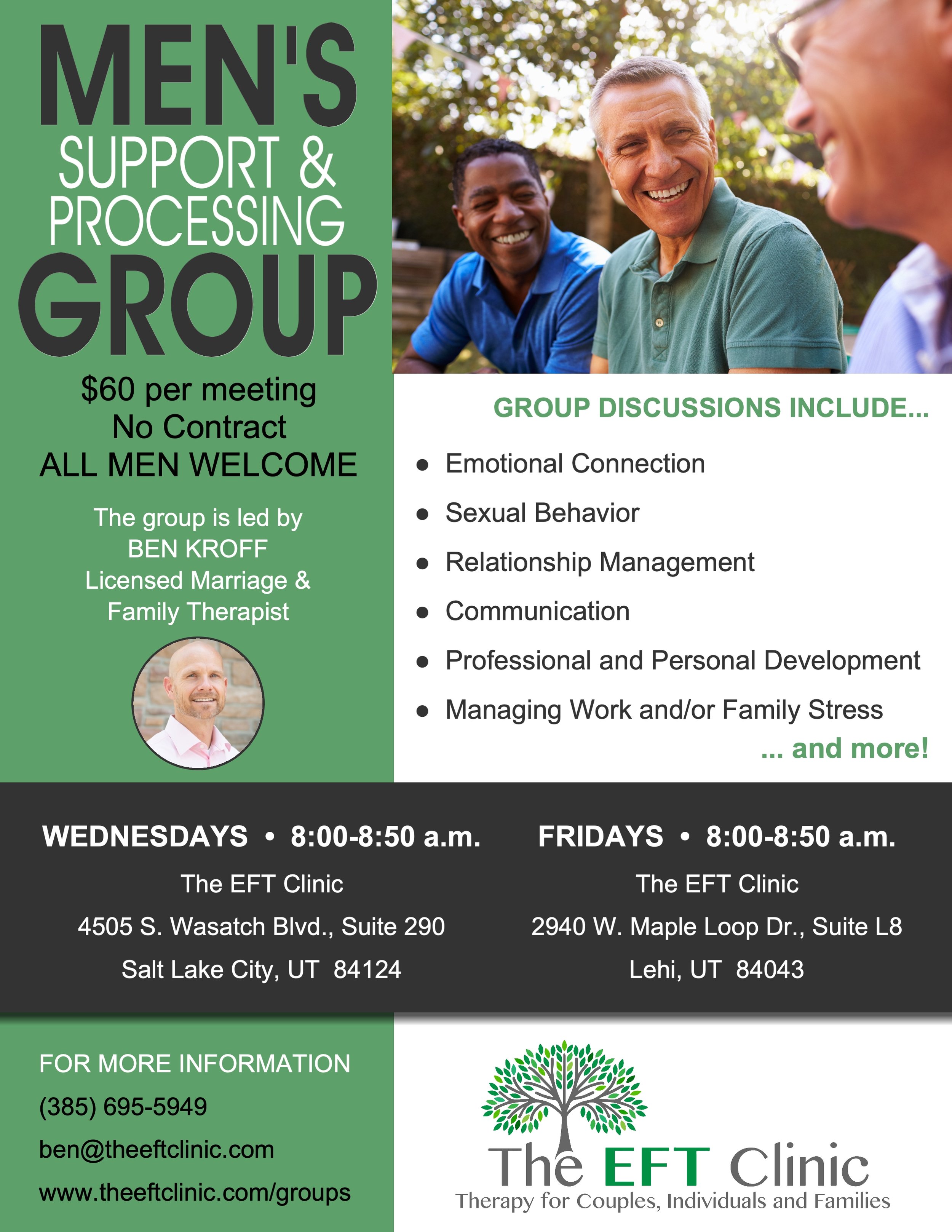"I'm Not Mad!"
/“I’M NOT MAD!”
The critical role of anger in the healing process.
by Ben Kroff, LMFT
I was getting destroyed by my brother. There was nothing I could do to return his quick hits, impossible spins, and relentless assaults. I was going to lose again. He was simply a more skilled and experienced ping-pong player than I was. I was quickly losing my composure, my mind, my body, and my emotions were unraveling under the distress of trying to compete against an older and more accomplished opponent.
Noticing my increasing despair and frustration, my brother began laughing. “Ha ha, you’re getting mad.” In my 15 year-old cockiness, I denied his assertion. “I’m not mad,” I calmly replied, trying to maintain a cool, collected exterior. I wasn’t fooling anyone. He could still sense my duress and continued to chuckle as I would make increasing expressions of anger about my impending demise.
I was afraid. I was frustrated. I was embarrassed that I was losing, and ashamed of my inferior skills. I wondered if I would ever be as good as him, or if I should ever attempt to play this stupid game again. I questioned why I was so gullible as to agree to engage in this exercise of futility in the first place. I began to question my life’s decisions, and even my worth as person. Why did I decide to enter into a relationship where I am now feeling beaten, embarrassed and inadequate?
That is what was really happening. Those were the difficult emotions that I was feeling swirling around in my head and heart, and literally coursing through my veins (or my nervous system, to be more scientifically accurate). That is what I was feeling. But how would I know that, let alone express that in the heat of battle? All I could say to my brother in response to his astute observation is, “I’M NOT MAD!”
Being “mad” or feeling anger is a secondary emotion. It is a response to a primary emotion, or a deeper emotion. When we are feeling or expressing anger, we are experiencing a response to pain. When we stub a toe we yell out in pain; we feel angry that we are hurt. We respond the same way to emotional pain. We may feel embarrassed, lonely, forgotten, rejected, dismissed, overlooked, unloved, left out, confused, etc., and we respond by getting angry.
It is often hard to recognize those deeper, softer, primary emotions, but it is easy to recognize anger. This is why anger is so important! Anger sends up a red flag. It tells us, “Hey, I’m hurt!” When we can notice anger for what it is — a pain response — we can pause, be curious, discover the deeper primary emotion that is hurt, and begin to heal.
To learn more about these important secondary or deeper emotions, and learn how to use anger to discover pain and begin healing, call and schedule with me today.
Ben is a Licensed Marriage & Family Therapist at The EFT Clinic. He specializes in working with struggling teens, young adults, and families. With a background of serving youth in custody, Ben has successfully helped clients deal with addiction, aggression, decision making, relationship management, and self-esteem. In addition to Emotionally Focused Therapy, he is experienced in Dialectical Behavioral Therapy, Cognitive Behavioral Therapy, and Aggression Replacement Training.
To schedule an appointment, email ben@theeftclinic.com or call (385)695-5949.
B.L.A.S.T. - Five Feelings that Impair Decision Making and Lower Resolve
/B.L.A.S.T.— Five Feelings That Impair Decision Making and Lower Resolve
By Ben Kroff, LMFT
When discussing in therapy sessions ways to overcome various challenges, it is easy to imagine implementing our new insights and ideas in real-time. Why then, do we find ourselves not applying our well-laid plans long-term? Why, when in the heat of the moment, do we act opposite of what we know would be best?
The following five feelings act like clouds of confusion that can impair judgment and lower our resolve, even after making a decision.
Bored —We can all relate to going to the fridge and looking for “whatever” because we have a gap in our schedule and nothing to do. Kids who get into trouble at school have found creative ways to manage their boredom, whether with spit wads, teasing their classmates, or scratching their names into their desks. What do you do when you are bored? What vice do you entertain to help fill the time? Be careful of this moment in time; you may not be making the wisest use of it.
Lonely —“No one cares about me anyway.” When we feel isolated, disconnected, or alone, we are more likely to engage in undesired self-soothing behaviors. We may feel at liberty to indulge because there is no accountability, no one to report to, to check in with, or seek validation from. When you are feeling tempted to engage in an unhealthy compulsion, consider who you might call, pay a visit, or reach out to. Connecting with others can remind us that we are cared for and that others support and believe in us.
Angry — Our limbic or “reptilian” brain takes over when we are flooded with strong emotions like anger. During this time the executive functioning part of our brain, where we make decisions based on reason and logic, becomes inhibited. Understanding this, we are not surprised that such terrible decisions are made in anger. Breaking things, saying hurtful words, driving recklessly, or walking off a job are examples of regrettable decisions that are made when angry. Paying attention to our behavior can reveal our anger and act as a warning sign that we need to calm down and reconsider before acting.
Stressed — When we’re stressed, it’s surprising how quickly we can consume unhealthy snacks. Have you ever watched a tense movie and found out you not only ate the popcorn in 30 seconds but the bucket is missing as well? Like anger, stress increases our limbic brain activity where we act on emotion and reduces our executive functioning or “thinking” part of our brain. Using grounding and calming techniques like deep breathing, physical touch, or even a quick meditation can lower our stress and shift our thinking back to the present where we can make safer, healthier decisions.
Tired - Hundreds of recent studies have highlighted the dangerous effects of sleep deprivation. Our brains literally starve when we don’t get adequate rest. Making critical decisions when we are tired can lead to poor outcomes. Before deciding to quit a job, leave or start a relationship, or make that spontaneous purchase, make sure you are rested. Even 10 to 15 minutes of sleep can reset our mood, increase our resolve and help us manage tasks and relationships with increased clarity and confidence.
Remember these five feelings by memorizing the acronym “BLAST”, and consider measuring your status in each category when you find yourself making important decisions. Like a quick pro-con list, this exercise in self-awareness could be the gate protecting you from facing future regret.
Ben Kroff is a Licensed Marriage and Family Therapist at The EFT Clinic in Salt Lake City and Lehi, Utah. If you would like to schedule an appointment with Ben, you can email him at ben@theeftclinic.com or call our scheduling line at 385-695-5949.
Please Fix My Kid
/Please Fix My Kid
By Ben Kroff, LMFT
When our cars aren’t working well or something is broken, we are fortunate to be able to simply drop the car off at the mechanic and let them solve the problem; they do their mechanic magic and call us when it’s all fixed and ready to go. It would be AWESOME if we could drop our kids off at therapy, let the therapist do their thing and have them call us when our child is ready to listen, cooperate, get out of bed, go to school, get good grades, treat their siblings better and make better choices.
Unfortunately, kid problems are more complex than car problems. When a child starts exhibiting symptoms of distress, whether they are behavioral, emotional or psychological, we need to step back and take a look at the bigger picture. What is happening in their home environment, social circle, or academic setting? When our child is displaying problem behaviors, it is a sign that something in their environment needs to change. Just as pain in our bodies are signals that we need to change something, if your child is in pain, or if they are causing you pain, it is a sign that something in his or her environment needs to change. Often this change is not something that the child alone is going to be able to accomplish, even with the help of a qualified therapist. The child is part of a larger system that is impacting his or her mental health. The best chance for successful change will be found when working with the child’s most significant relationships.
When waiting for our car to be serviced we can enjoy flipping through magazines, scrolling through Facebook or even eating popcorn in the waiting room; if you are taking your child to therapy and are enjoying quiet time in the waiting room or running errands during their session I would invite you to reconsider how this time is spent. If the therapist hasn’t invited you into the room, ask if you can join. There is much to be gained in joining your child in their pain, in seeking to support and understand and be involved in their recovery. Maybe not every session will be appropriate for family members to join and your child and their therapist can identify those times, but more often than not great work can be done by bringing the child’s significant relationships—like their relationship with their parents—into the therapy office together.
Ultimately, healing comes through nurturing connection. If your therapist has not offered this approach or doesn’t feel comfortable with involving more of the family in therapy, you may want to look into switching your child to a Licensed Marriage and Family Therapist (LMFT). These therapists are trained in therapeutic models that incorporate this larger, systemic family approach. At the EFT Clinic many of our clinicians are LMFT’s and all of our therapists have been trained in relational Emotionally Focused Therapy. We look forward to helping you and your loved ones.
Ben Kroff is a Licensed Marriage & Family Therapist at The EFT Clinic in Salt Lake City and Lehi, Utah. To schedule an appointment with Ben, email ben@theeftclinic.com or call our office at 385-695-5949.
Do I Matter?
/Do I Matter?
Ben Kroff, LMFT
If you've never seen "The Still Face Experiment," please click the link or scroll down to view it now! It will forever change the way you interact with your children, grandchildren, or significant other. The video shows how distressing it is for an infant to feel disconnected from a caregiver. The visible distress that overtakes the little ones is heartbreaking and incredibly insightful!
Human beings are designed to thrive through connection to other human beings. As mature adults, we cannot pretend that we no longer need this connection. In Emotionally Focused Therapy, there is something known as the “$64 million dollar question”. That question is, "Do I matter?" What happens when we feel like we don't matter? We fall into distress just like the little babies did in the "Still Face Experiment" and we begin fussing and crying out for attention.
Have you ever been on a phone call and had your little one immediately begin tugging at your pant leg? They have sensed your shift in attention. You are no longer available so they begin doing all they can to get you reconnected to them.
What are you doing to reassure those who you value that you are available and responsive to them? Do you see how desperately they are trying to get you to connect? Notice the similarity of the parents' facial expression when they are non-responsive to their children. Now picture what your face may look like if you are glued to your phone or otherwise distracted while your child makes a bid for your attention. I imagine it looks very similar to the still face of the parents in the video.
Let's practice putting down our distractions, turning toward each other, and connecting. Let's look at our loved ones when they speak to us. Let's show by our focused attention to others that they matter to us. This small change will do miracles in calming the conflict in our relationships.
Ben is a Licensed Marriage & Family Therapist at the EFT Clinic in Salt Lake City and Lehi, Utah. To schedule an appointment with Ben, you can email ben@theeftclinic.com or call 385-695-5949.








